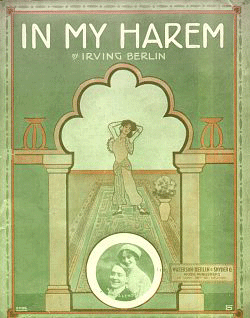
Ah, vaudeville. Before Elvis, the Beatles and the Beastie Boys, there were those corny songs targeting recent immigrants to America. One of those immigrants with a Sicilian last name would have been my grandfather, Martin Varisco, who in 1913 left the Big Apple Blossom to work on the railroad and work his way west. He made it to Ohio, where he married and settled down. But the very year he left New York, the songwriter Irving Berlin produced one of his less memorable songs. This was for the Irish, not the Italians, an important distinction on the streets and in the bars at the time. But here’s what can happen when Tin Pan Alley gets confused with Midaq Alley: an Irishman named Pat Malone with rhyme running amok in a Turkish harem.
First, read the lyrics (if you want to follow the sheet music as the tune is played, click here).
In My Harem
By Irving Berlin
Published 1913 by Waterson, Berlin & Snyder Co.[Verse 1]
Down in Turkey-ur-key Pat Malone
Was selling fancy clothes to any one who’d wear em.
When the Turks were called away to war,
A Turk asked Patrick if he wouldn’t watch his Harem;Patrick said, “With pleasure,
I will cover ev’ry track,
I’ll take care of ev’ry thing,
so don’t you hurry back.”Patrick then sat down
and wrote a note
To all his friends at home,
and this is what he wrote,[Chorus]
In my Harem, my Harem,
There’s Rosie, Josie, Posie,
And there never was a minute
King Solomon was in it,Wives for breakfast, wives for dinner,
Wives for supper time;
Lots of fancy dancing,
and it doesn’t cost a dime,In my Harem, my Harem,
There’s Fannie, Annie,Jenny,
And the dance they do
Would make you wish
that you were in a Harem with Pat Malone.[Verse 2]
Patrick said, I’ve got a thousand wives,
And ev’ry one of them has got a perfect figure.
Small ones, tall ones, big as they could be,
There’s some as big as that, and some are even bigger.That young Turk ain’t coming back until the war is won,
I don’t wish him hard luck, but I hope they steal his gun.
I am living many happy lives,
How can a man get lonesome with a thousand wives?[Chorus]
Apart from the Western male fantasy of bathing with odalisques in a garden of 1001 delights, this song is notable for the way in which the Turk is depicted not as some evil enemy, but the age old icon of a cuckold. The war in question in 1913 was only on the horizon in global terms. The Ottomans were constantly in conflict attempting to hold on to the trappings of a once imperial porte, but the Austro-Hungarian Archduke Franz Ferdinand would not be assassinated in Sarajevo until June 28, 1914 and Turkey did not enter the fray until October 29, 1914. It was still okay to sing about intrigue in a Turkish harem, because Gallipoli was not yet a battle in the history books.
Pre-the-war-to-end-all-wars and before oil pumped up Western interests, this song and many others on the stage musically orientalized the Turk in similar ways to Valentino’s The Sheik swooned image-makers of the Arab. But the focus is less on the Turkish man, who is absent in the poem and not belittled for his military spirit, than the availability of beautiful harem girls, all with a perfect figure, and all willing to dance for free (for all those Irishmen who did not want to stop on a dime). No doubt all it would take was adding an “l” in the right spot of this harem to make such a female treasure more than a dream.
Daniel Martin Varisco